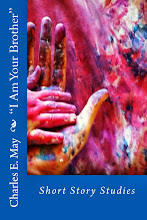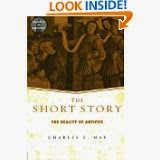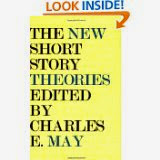One of the most frequently asked questions
at short story readings is: "Where did that story come from?" or
"How did you get the idea for that story?" It's a perfectly
legitimate question. Indeed, what other
question can readers ask a writer about a story? Questions such as, "What does that story
mean" or "What is that story about? "can only be answered,
however tentatively, by readers, not writers. The question usually derives from
the reader's sense that a story comes from "real life," which is
usually more respected than "fiction." It often means, "O.K. I have heard your
'made-up' story; now tell me about the 'real' thing.
Because this is such an inevitable reader
question, the O. Henry Prize Stories'
appendix, "Writers on Their Work" and the Best American Short Stories' section "Contributor's Notes"
usually focus primarily on writers talking about the source of their story. The
following are the four most frequently-cited sources of the stories in both
volumes. I will talk more about the
stories in the next few weeks.
Beginning with Personal Experience
Sometimes,
but certainly not always, stories come from personal experience. Louise Erdrich says that her story
"Nero" (O. Henry) was based on the fact that her grandparents
really did have a dog named Nero who was always escaping from the backyard. She
also says the python experience in the story was based on actual experience, as
was the fact that her grandfather wrestled for prize money in small farm towns
in Iowa. But personal experience does not mean anything until it is made into a
story. Erdrich says she did not know what to make of Nero until one morning
when she was writing this story. Erdrich suggests that in the process of
writing this story, she discovered it was about "existence, inevitability,
and time."
Joyce
Carol Oates, the consummate "profession" writer, seems to create
stories out of everything she comes across, says her story "Mastiff" (BASS) derived from an actual experience when she and
her husband went hiking in a canyon near Berkeley, California. She says the
experience was so vivid and her emotions so intense, it was not difficult to
write the story; she insists, however, that the story is fiction,
"whatever its wellsprings in actual life."
One
of the most common bits of advice often given to MFA candidates is, "Write
about what you know." But that
perhaps does not always work best. David
Bradley ("You Remember the Pin Mill," O. Henry) says he started out wanting to write about what he knew—the
experience of black Americans," but changed his focus when his agent suggested,
"Why not write about white people." When he wrote about a couple of
white guys in a rural area of Western Pennsylvania both in love with the same
woman drinking beer in a pickup, a magazine ran the story with an illustration
depicting both men as black. Bradley
notes, "Stereotypes and expectations apply to writers too."
Maura
Stanton says her story "Oh, Shenandoah" (O. Henry) began with a
personal experience of breaking a toilet seat in the apartment she was renting
in Venice. When she tried to find a replacement, she realized what an absurd
quest it was to try to find a toilet seat in a city full of glass and lace and
masks and marbled paper. She thought this "unromantic side" of Venice
might be interesting to write about. But
this was just an anecdote, not a story.
It was only when she came up with Marie's need to make a decision about
Hugo and her recollection of hearing a chorus of college students singing
"Shenandoah" once in Venice that she knew what to do with Hugo.
Stanton says "once my invented world got untethered from the real world
and started obeying its own laws," she was able to find the toilet seat;
that is, she was able to discover what the story was about.
O.A.
Lindsey, whose story "Evie M" (BASS)
derives from his combat experience during Operation Desert Storm, says the gist
of the story is a nontraditional soldier facing "postwar pinpricks and the
anxiety related to each."
Will
Mackin's story "Kattekoppen" (BASS)
also stems from military (Navy) experience, this time in Afghanistan, in which
he felt he never quite got his bearings and that every day was an exercise in
crisis management.
Beginning
with a Concept
It has always been my opinion that good
short stories are usually about universal mysteries of human experience. Although this means that a short story is
more often focused on theme than merely on plot or character, it does not
necessarily mean that a short story writer begins with a theme or idea and then
develops plot and character to embody that theme. Indeed, such a tactic is apt
to create a static "illustration"—at its most extreme an exemplum or a
story with a moral.
However, sometimes a story does begin with
a concept. For example in BASS, Charles
Baxter's story "Charity" is one of a series of stories Baxter conceived
on virtues and vices. Baxter had a story in last year's BASS entitled
"Bravery." Both stories will appear with others in a new book due out
in February 2015 entitled There's
Something I Want You To Do. The
interrelated stories, featuring characters that appear and reappear, are in two
sections--one devoted to virtues (“Bravery,” “Loyalty,” “Chastity,” “Charity,”
and “Forbearance”) and the other to vices (“Lust,” “Sloth,” “Avarice,”
“Gluttony,” and “Vanity”).
The
problem with such an approach, as Peter Cameron ("After the Flood," BASS), observes, is, what might called,
the exemplum effect. Cameron says that since he does not write short stories
very much anymore, he has to give himself some assignment or problem to solve
in order to "jump-start" a story, hoping that such a "forced
inception" won't weaken the story, that the story will "transcend its
deliberateness."
Molly
McNett says her story "La Pulchra Nota"
(BASS) began as a contemporary story about a high
school choir director falling in love with his student's beautiful voice, but
then she found a text on singing that mentioned the theory of la pulchra nota, about teaching from the
perfect note by Medieval music theorist Jerome of Moravia. Her story began to come together when she decided to
put the story in that era. Then she came across a story of a man who lost his
whole family in a month and still maintained his faith and trust in God. She says she wanted her voice teacher to have
that kind of faith though she can't claim to share or fully understand it.
Nell
Freudenberger's story "Hover" (BASS)
began with the notion of a mother who could fly---not like superwoman, but
rather sort of a gentle lift off the ground to hover in an
awkward, unplanned, useless sort of way.
Chinelo
Okparanta says her story "Fairness" (O. Henry) began with wanting to explore an issue she observed in
women in East and Southeast Asia of women of a certain class wanting to keep their
skin color light. The issue she explored,
she says, however, was about loyalty and betrayal across social strata, not
about skin bleaching.
Beginning with an Obsession
Some
stories begin with an obsession, either a general obsessive focus of the writer
or a particular event or observation that haunts the writer.
Allison
Alsup ("Old Houses," O. Henry) tells
about learning of an unsolved double murder of a wife and daughter in her
neighborhood when she was a child. She was friends with a girl who lived in the
house of the suspected murderer, a teenage boy. She and the girl thought the
house was haunted. She says she was never able to reconcile that violence with
the peacefulness of her street and felt compelled to write the story "in
order to discover its potential significance." "Writers are negotiators," says
Alsup, "hashing out ideas until seemingly opposite camps can sit at the
same table and come to some sort of understanding."
Craig
Davidson ("Medium Tough," BASS)
says he is always interested in characters who are physically and emotionally
broken; he says he likes characters who keep on trucking despite what life
throws at them. He says he is not sure why he is drawn to such characters,
although he thinks perhaps a therapist could.
Kristen
Iskandrian says "The
Inheritors," (O. Henry) revolves
around some of her pet obsessions, the most fundamental of which is the
"multilayered entity of the female friends, and wanted the "fumbling
bloom of a relationship" be the story's "pulse." She chose a
consignment store as the primary setting because she likes the "sentimental
mess of things disowned and things reclaimed, an orphanage for
objects." In such a place, she says
her characters reveal their disparate desires and "inscribe one another."
Beginning with an Image
Often
stories begin with an image. Olivia Clare ("Petur," O. Henry) says that when she lived in Iceland
in 2010 for a short time, she saw the land covered with ash from the eruption
of a volcano and imagined "a preternatural mother venturing out into an eerie
scrim of ash"; almost before realizing what had happened, she imagined the
woman meeting someone.
David
Gates says his story "A Hand Reached Down to Guide Me" (BASS) began with an image--not one he
remembered, but rather one a friend remembered of seeing Gates playing mandolin
in a coffeehouse in New Haven when he was a high school kid. He says he recalls
a fellow student at Bard College with a TR-6, and the death of the mandolin
play in the story shares some details of the death of his father. He once kept
chickens and he is a student of nineteenth-century British novels. Thus the story is a patchwork of many different
things that seem to "come together" meaningfully.
Dylan
Landis ("Trust," O. Henry) says it was an image of a teenager sneaking
though her father's filing cabinet that sparked the story of Rainey Royal
digging around and spotting her hated middle name on her birth certificate—a "fishhook
that snags everything she finds unlovable in herself. The second image—which Landis
says surprised her--was a gun tucked between file folders. Landis says she
believes if you "root in the basement of the mind and grasp and object in
the muck, your subconscious put it there for a reason." Landis says that
as she wrote the story she had no idea how it would end, noting, "With
every story I write, I like finding my endings in the muck of the basement
too."
Mark
Haddon ("The Gun," O. Henry) says "Good stories seem
to come from some weird zone it's impossible to access in retrospect.
"After all," he says, "if we knew how they came into being
they'd be a damn sight easier to write."
He says he only knows he had been "haunted" for a long time by
the image of two boys pushing a pram containing a dead deer across the highway
several miles from where he lives. He says he has no idea where the image came
from, only that it had a particular charge and stuck with him. Haddon says the
story contains several elements that keep cropping up in his writing, including
a locale that might be described as "grubby, liminal, unloved places that
are neither town nor country, whose ownership is dubious and that are never en
route to anywhere," but, he adds, that might "just be portals to
somewhere else altogether."
Stephen
O'Connor says "Next to Noting" (BASS)
would not have been written if it were not for Hurricane Irene. However, he
says the "real inspiration" for the story was an image that just
popped into his head of two sisters with black pageboy haircuts and eyes pale
blue like the moon. When he started developing the image, he realized that wo
sisters were entirely lacking in "fellow feeling," and consummately
rational. When he realized that this seemed parallel with nature, he knew he
would have the two women face Hurricane Irene—all of which became a means by
which he could explore his longtime notion that although he is an atheist there
are certain things he wants to believe that cannot be sustained by rational
interpretation.
All of the Above
Of
course, most stories combine all four of these "sources," as the
writer engages in a dynamic process of discovery "about" something
mysteriously human. The story's relationship to "real life" is usually
more complex than the question about
where the story comes from assumes and can only be discovered by the reader's
engaging in a close reading of the fictional life of the story.





No comments:
Post a Comment